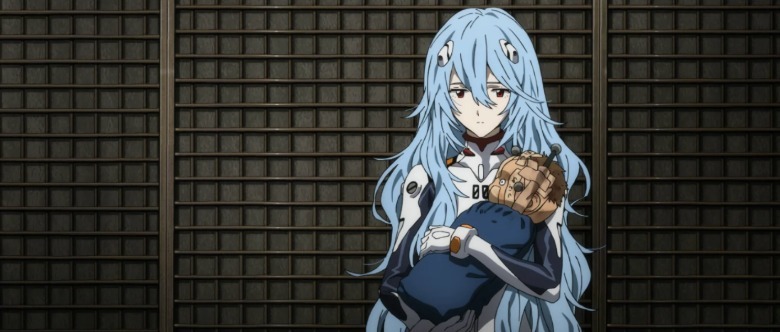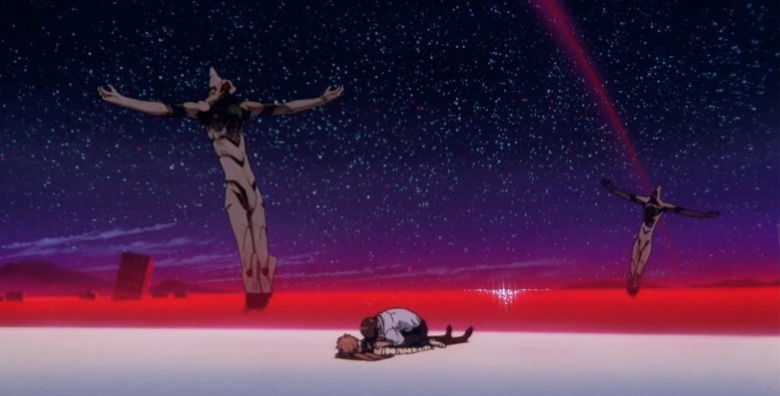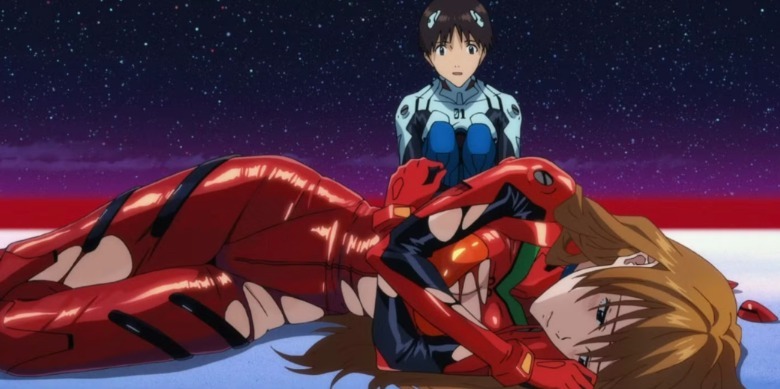
The first half of “Thrice Upon A Time” is set in a peaceful village, where Shinji, Asuka, and Rei take a break from the action. Their old friends Toji, Kensuke, and Hikari have all grown up, becoming adults and building peaceful, normal, and domestic lives that the Pilots have been cursed not to. Shinji breaks the curse and gives his friends the chance to live those lives.
In Shinji and Rei’s last scene together, she is holding a doll representing an infant. Motherhood has been a motif with Rei’s character going back to the original “Evangelion,” and obviously a dream she could never realize, especially with the newly-introduced curse.
Shinji and Asuka’s goodbye takes place on a surreal shoreline with blood red water, a sight familiar to “Evangelion” fans.
“End of Evangelion” concludes with Shinji and Asuka lying together on that same beach; they’re apparently the only two who’d chosen the painful uncertainty of reality over the bliss of non-existence. Shinji strangled Asuka, while she caressed his cheek. Shinji stopped and began to cry, as Asuka looked on in revulsion and whispered, “How disgusting.” That scene is a microcosm of the relationship the two share and the world they live in, where people can keep hurting others over and over even if under it all they care about each other (which is one of the ways “Evangelion” resembles “Eternal Sunshine of the Spotless Mind”). Shinji and Asuka have always been on that beach — but no more. They admit they liked each other once, but have grown apart and it’s time to move on. To show this time is different? Asuka is finally an adult; her old Eva plugsuit is half-torn and her hair braids are discarded on the ground, because she no longer has any use for them.
Shinji’s final act is giving the world a fresh start. He and everyone else can only be happy in a world with no Evangelions (gee, wonder what Anno is saying there), so that is the “Neon Genesis” he creates. In the last scene, an adult Shinji meets Mari at a train station and they run off into a new world, the real world, and one brimming with possibility. The Curse of Eva and the cycle of stagnation it represented is broken.
In “The End of Evangelion,” Misato tells a near-catatonic Shinji that, to live, he can’t be afraid to make mistakes. She’s kept making the same ones over and over again, learning a little bit more each time, and that is inevitable when you choose to accept the risks that life brings. At the end of the film, Shinji has accepted that too; his happiness is not guaranteed, but better that he gives himself the chance to find it.
The message of “Evangelion” never changed (accept yourself, because you’re all you’ve got forever, and go and find your happiness), it simply evolved. Anno ended “Evangelion” the first time by leaving his characters in uncertainty, and he returned to it to end their journey. By letting his characters grow and move on, he hopes his fans will too. If Shinji and Asuka learned there’s way more to this life than Evangelions, why can’t we?




Leave a Reply